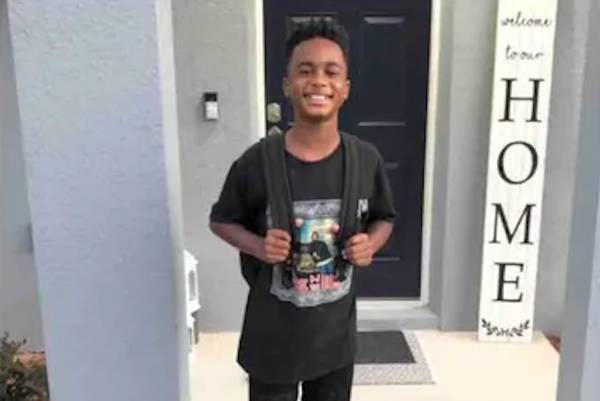
“In terms of the breadth of talent, from emerging to established names, it’s the most exciting Manchester has been in my time,” says Rivca Burns, a 20-year veteran of the city’s music scene who is creative director of Salford’s Sounds From the Other City festival. “In terms of the infrastructure, it also feels like a precarious time. We’re losing rehearsal spaces and grassroots venues are struggling.”
In 2023, Aitch and Meekz are flying the flag for Manchester rap, Blossoms from nearby Stockport have updated the region’s indie with soft-rock pomp, and artists such as R&B singer-songwriter Pip Millett, speed garage producer Interplanetary Criminal, doom-punks Witch Fever, trip-hop experimentalists Space Afrika and industrial outfit Mandy, Indiana are pushing forward a city that in the past has been guilty of letting Madchester nostalgia overshadow the new. Even in the shadows that Burns describes – of post-pandemic debt, the cost-of-living crisis and the threat posed by commercial development to independent venues – Manchester continues to channel its innovative and creative spirit into supporting a new wave of talent.

Gorton-born rapper Meekz, whose mixtape Respect the Come Up charted at No 12 last year and who performed at the Brit awards with Dave, is buoyant about how the Manchester rap scene has “come a long way” – in years past, he says, “if you rapped from Manchester, it wasn’t cool, people used to rap American. The music scene is definitely in a better place than when I started. It’s amazing to see Manchester get that recognition – we just need to even out the dividends.”
Those dividend issues – such as income lost during the pandemic, and artist pay in the age of streaming – will be on the agenda at Beyond the Music, a Mancunian conference in October founded by Oli Wilson, the son of city music icon Tony Wilson. A&Rs will be able to check out live talent at grassroots venues in the city, and initiatives will be launched to help improve mental health provision in music and expand live music and other opportunities beyond the city centre.
Beyond the Music will have a co-operative structure and what Wilson calls an “integrated decision-making process”, to “offer industries the chance to come together outside of the usual business context and actually solve problems and face challenges together”, in the cross-genre spirit of a new Manchester scene where people try to help each other out.
Sounds From the Other City, held in small venues across Salford including The White Hotel and Partisan Collective, is similarly “run by the city for the city,” says Burns. Promoters from across the north-west like Fluff and Chipped Polish are given a venue, a budget and the number of acts required, and told to choose the music they’re most excited about – the result is a diverse festival channelling everything from folk to Afrobeat, hip-hop and techno.
Beyond the Music launches at Austin’s SXSW festival this week with a performance from music ambassadors New Order. Another ambassador is Andy Burnham, mayor of Greater Manchester, who set up the Greater Manchester Music Commission last year: this group of music industry leaders, labels, venues and artists meets quarterly to develop musical talent, audiences and international awareness.

Emerging artists can also submit tracks to be played on Burnham’s monthly BBC Radio Manchester phone-in, with warm-up slots at Manchester’s £365m, 23,500-capacity Co-op Live arena also up for grabs. Burnham hails the aforementioned Tony Wilson, who used his platform as a presenter on Granada TV to “promote bands relentlessly any opportunity he got, even after the news. I thought: what’s the modern equivalent of that spotlight? I have a platform where I can give bands a lift.”
Another scheme is from Manchester international festival’s Factory Sounds support programme, which includes 10 x £1,000 financial support grants alongside development opportunities. Previous alumni include All Hands on Deck, a collective supporting women, non-binary and trans DJs; Balraj Samrai, producer, facilitator, educator and co-founder of SEEN magazine; and Loose Articles, a prominent female punk band heading to SXSW to promote Beyond the Music.
Loose Articles also toured independent venues across the northwest as part of the Arts Council’s Kick Like a Girl project, designed to encourage women into the music industry – tickets included soundcheck shadowing and a post-gig Q&A. “There’s a really healthy scene of female-identifying bands coming through,” says Tree, rhythm guitarist and vocalist for Loose Articles, with lead guitarist and vocalist Erin adding: “Like everywhere, it’s still definitely male-dominated, but I think us and a couple of other bands like Duvet and the Red Stains are building a really supportive scene.”
Away from government support, independent Manchester labels, venues, club nights and artists continue to thrift and hustle. Sour Grapes, a rock label that resides in the Northern Quarter’s Afflecks, also runs the UK’s last remaining cassette shop. Dr Dre’s The Chronic will set you back £24, but the money goes back into Sour Grapes putting on £3 entry, word-of-mouth sweatbox gigs at independent venue Big Hands.

Danny “Falz” Fahey, culture and partnerships director at Thirty Pound Gentleman – a Manchester creative company working in music, fashion and sport, and nurturing musical talent like local artist Chunky – hails organisations like Sour Grapes as part of a wave of “new superheroes” devoted to “the radical DIY way of doing things in Manchester. The Habitat [club night] guys, the people behind [Salford venue] The White Hotel, and places like Hidden who are subsidising losses by hiring out studio space.” He cites “amazing new venues” like Canvas, “Manchester’s best venue for sound, audiovisual and fashion” that has prospered by putting faith in young promoters to put on events.
Then there’s the city’s independent radio scene. “Pie Radio has been absolutely instrumental in Afrobeats, amapiano and supporting African youth,” Fahey says. Pie has organised large-capacity events across the north-west with proceeds going back into supporting the station, and a June event, Kings of Amapiano, will be the station’s biggest yet, adding to the city’s rich festival calendar.
“You’ve also got Reform Radio, an amazing award-winning, super-inclusive platform – hands-down one of the most important organisations in Manchester when it comes to supporting music infrastructure,” Fahey adds. The station started out 10 years ago in a shared-house basement, with shows from the likes of Jenna G, T Dot (Tunde Adekoya) and Mica Millar, before moving into the former site of Granada Studios thanks to a partnership with property developers Allied London, who provided the station with subsidised space in the old Coronation Street dubbing suite. This development tactic, of hosting creative companies to make an area feel hip and aspirational, is often criticised as a force for gentrification – but in this case it has been crucial for Reform, who have platformed new music and provided young people in the city with skills, with shows providing a CV for DJs and producers to get paid work elsewhere in the city, be it in clubs or the BBC.

Michael Adex is another person who embodies the new entrepreneurial spirit of present-day Manchester music. He discovered Moston rapper Aitch, turning him into a household name while building a globally-renowned label and entertainment agency, NQ, with a roster that includes rappers, producers and even magicians. NQ celebrates its fifth birthday this summer, and is aiming to give back with its non-profit arm, NQ Legacy, which offers mentoring, subsidised studio space, workshops, talks, networking sessions, tickets to live music events, field trips and hands-on video and recording experience.
“Most artists coming through NQ struggle with opportunities,” says Adex, who this month was named by Forbes Europe as one of the region’s 30 best entrepreneurs under the age of 30. “A lot of artists who are still talented within their own right don’t have the opportunities and the team to really help guide them; a lot of artists don’t have the financial capabilities to finance their careers. Not many people from my background have the opportunity to do what I do – so it’s great to be able to really show them that anything and everything is possible.”
Salford rapper Strategy, who is also a youth worker, has seen first-hand how music can improve lives, and he finds joy in “teaching somebody that they are able to create – not everybody knows they can do that. I’ve seen the work I’ve done with young people have a profound effect on their life, the way they carry themselves, their confidence.” As for what’s gone before, he’s enjoying being part of a new chapter. “It’s up to us artists to make them forget about the Hacienda for a minute.” Maybe an old adage needs updating: what Manchester creates today is what the rest of the world listens to tomorrow.
• This article was amended on 17 March 2023 to give the correct name for Partisan Collective.







